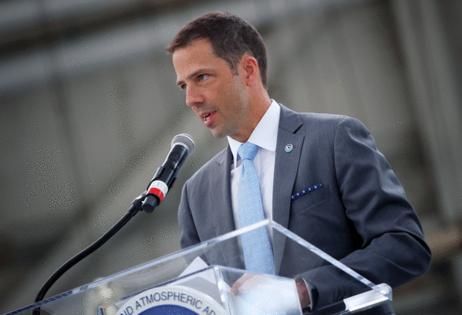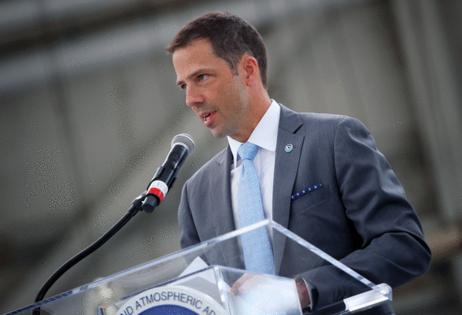Commentary: Why Trump favors Coast Guard over NOAA
Published in Political News
In the first week of October, with the government shutdown underway, the Senate confirmed President Donald Trump’s nominee to head up the National Oceanic and Atmospheric Administration (NOAA), Neil Jacobs.
Jacobs, who served as the acting under secretary of Commerce for Oceans and Atmosphere during the first Trump Administration, is best known for defending Trump after an embarrassing 2019 incident in which the White House appeared to alter NOAA storm projections to support an inaccurate statement by the president. His confirmation raises concerns.
NOAA and the Coast Guard are the nation’s leading maritime agencies for all things other than warfighting (the Navy’s role). The focus of NOAA has been on ocean and climate science, conservation and policy (plus the weather service) while the Coast Guard oversees fisheries law enforcement, oil-spill response, migrant and drug interdiction, search and rescue and more.
But now, both agencies are being redefined in ways that are deeply contradictory. A major reason for this, as happens often in authoritarian regimes, is the personal likes and dislikes of the nation’s leader.
When Trump visited the Coast Guard station closest to Mar-a-Lago on Thanksgiving Day 2017, he heaped praise on the agency, noting that it had saved thousands of people during that year’s hurricane season. As he put it, “I think that there is no brand, of any kind — I’m not just talking about a military brand — that has gone up more than the Coast Guard.” Plus, he complimented the crew on their muscular appearance.
Two years later, however, as Hurricane Dorian was heading into the Gulf of Mexico, Trump warned that the storm might hit Alabama, an inaccuracy the local NOAA Weather Service office quickly corrected. Shortly after, however, someone in the White House — whether or not it was Trump himself is unclear — used a magic marker to alter the NOAA map of the hurricane’s path, making it appear as if the storm also would encompass Alabama.
But even as late-night comedians took to making fun of the famously thin-skinned president’s actions in what they called “Sharpiegate,” Jacobs, then NOAA’s acting director, defended Trump while also emphasizing the “good intent” of the NOAA scientists who corrected him. Jacobs’ press conference — which brought him to the verge of tears — sparked backlash from the agency’s scientists.
Trump entered his second term last January with a more focused policy agenda largely defined by the Heritage Foundation’s Project 2025, which accused NOAA of being a leading force in the “climate change alarm industry” and called for it to be “broken up and downsized.”
And yet, on day two of his second administration, Trump took aim not at NOAA, but the Coast Guard, firing its commandant, Admiral Linda Fagen, the first woman to lead one of the armed services. Her dismissal was seen as a warning to other flag rank military officers that while top leaders at the Pentagon had resisted the president’s impulse to use military force domestically in 2020, things would be different during Trump’s second term.
In May, Secretary of Homeland Security Kristi Noem announced a new strategic plan for the Coast Guard titled “Force Design 2028” — a practical vision for an expanded and modernized service provided by a Coast Guard veteran serving in the administration. In July, Trump’s “Big Beautiful Bill” included an unprecedented $25 billion supplement for the Coast Guard on top of its $14.5 billion budget that will allow this modernization to move forward.
At the same time, NOAA is in the process of seeing its workforce reduced from more than 12,000 employees to fewer than 10,000. And the Trump administration is proposing a budget cut from $6.8 billion to $4.5 billion in 2026, a near 30% reduction that includes the elimination of all climate and most science-related programs.
During the government shutdown, many at NOAA are furloughed and at risk of a second wave of job cuts as Trump targets what he calls “Democrat agencies.” At the same time members of the Coast Guard are being paid while air traffic controllers and others are not.
The collaboration between these two agencies has long served the public interest from sea to shining sea. That is now at risk with NOAA floundering in a way no Coast Guard rescue effort can help.
______
David Helvarg is the executive director of Blue Frontier, an ocean policy group. Among his books is “Rescue Warriors – The U.S. Coast Guard, America’s Forgotten Heroes.” This column was produced for Progressive Perspectives, a project of The Progressive magazine, and distributed by Tribune News Service.
_____
©2025 Tribune Content Agency, LLC.



























































Comments